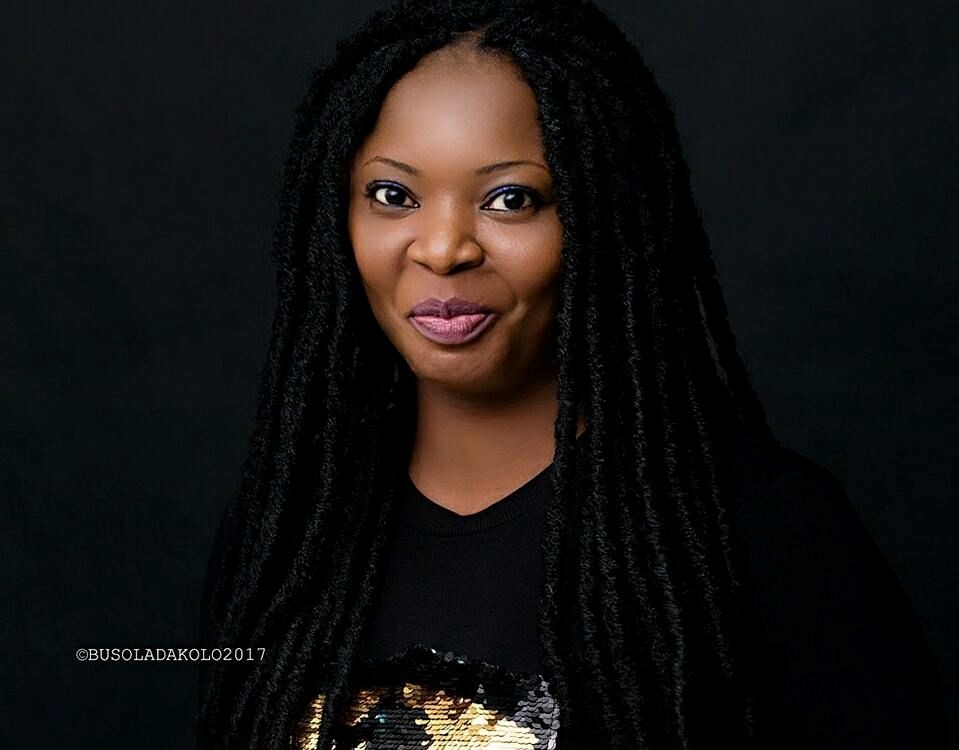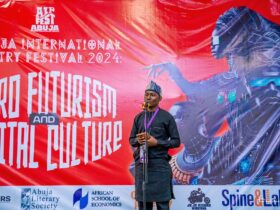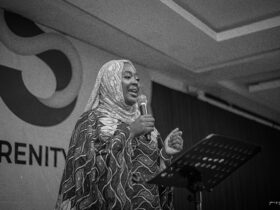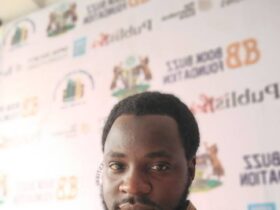
Konya Shamsrumi: What is the process of writing a poem like for you? Is it a lot of hard work or easy?
Timi Nipre: This is one question that always takes me off balance because I do not believe in any laid-out process for writing. For me it’s mostly inspirational. For me it just flows. I wake up in the middle of the night when the flow comes. It could also just come from watching birds playing or sitting by the seaside. Every time an aspiring writer reaches out to ask me about my “process”, to be honest, I never understand what they’re saying. I’ve met poets who follow a process and I have met poets too who write as it comes and I obviously belong to the category of the latter.
The word “process” doesn’t even make sense to me when it comes to writing. People might as well be asking about my “writing secrets” or “writing techniques” etc. Like, don’t get me wrong here, I surely understand the word “process” in and of itself, but not within the context of my writing at all. So, when people reach out to ask this, I mostly stutter through whatever it is I say.
Are they asking when I write? Where? For how long? Are they asking how many edits I make, whether I have “first” and “final” drafts, and how long I sit in between? Are they asking what kind of music I listen to, or whether I drink coffee or tea?
I really do not have a process. I just write as the stories come. Because, at the end of the day, no matter what I’m identified as, truth is deep down, I’m merely a storyteller. One who tells stories using different genres of literature.
Konya Shamsrumi: Please describe your sense of identity in this or any possible world in imagery or metaphor?
Timi Nipre: My sense of identity stems mostly from my cultural heritage, firstly I’m African and a proud one at that. Then again, I’m a full-blood Niger Deltan from Nigeria (popularly known as militants although I’d prefer to call us agitators). Because we were agitators first, before the latter branding. So like the majority of my people, I give my voice to the cause of not just a better Niger Delta but a better Nigeria. I can say I’m an activist, but with my pen.
I do not believe in today’s feminism as the idea of feminism, to me, it has been long bastardized. I believe in humanity and equity in place of equality. Equality preaches competition whilst equity preaches love and fairness for all. In my writing, my identity is of the two extremities of Campari, bitter and sweet. I celebrate the abundance of wealth from the shores of my land, yet lament of the suffering of my people because of this same wealth we’ve been blessed with.
I believe religion and politics have caused more harm than good in this world. Through all this, I have grown to become a storyteller in verse and prose. This last is the sum of my identities.
Konya Shamsrumi: If any of your poems could literarily save a person’s life, which poem would it be and can you describe the person whose life you think it would have saved?
Timi Nipre: The poem I’d love to think can save anyone is One For The Road. I wrote this poem to join my voice in reaching out to youths who indulge in the abuse of drugs and alcohol. I nearly lost a friend in my university days to excessive indulgence in alcohol. So, like David Jones would say, “Even though e no do me, e been do my paddy oh”. It is a Say No To Drug Abuse campaign poem. Here—
Telimote ordered the next round,
As he screamed
at the bartender at 64 lounge...
'One for the road.'
One for the road,
Was his way
Of ending the day's groove.
It's always been norm.
'This time make it tequila,
Remember the salt and lemon
And lighter for that fire.'
That tradition is how we end the night.
Tebeowei rushed the drinks again
'Morocco' he screamed once more.
The concentration game,
Had taken a toll on him.
But the game went on...
Names of Nigerian schools?
'Morocco,' he screamed again
'Shack' we all chorused at his response.
And that was it...
Tebeowei shacked and slumped.
He died afterwards...
Because he took one for the road.

Konya Shamsrumi: What does Africa mean to you, as potential or reality?
Timi Nipre: Africa means life to me. Not only do I love being African, but I am proud of it. As an African, I feel it in my soul, the struggle of my ancestors and the journey. It’s encrypted, that is why spirituality and culture matter to me. As an African in this part of Africa, I must say I am of a certain privilege. There are plenty of opportunities for me here and I can be whoever I want to be, which is a really special feeling.
From when I was much younger, I’d always envisioned Africa as the light of the world. Hence the storm is always raging to take away her light.
Being alive in this period, I see the attempts of Africans trying to go back to their roots. Music, fashion and all forms of the arts are now sheened with traditional African veils and this makes me happy. We need to be more deliberate in telling our stories ourselves.
I am proud that clothing brands like Jewel by Lisa Folawiyo uses Ankara, a traditional West African fabric, to create captivating and luxurious custom prints. She has her own fabric line that also produces accessories such as jewellery and purses. Line J label, her diffusion line, showcases the best of tasteful urban designs. Some of her celebrity fans include Beyonce, Kelis,Tasha Smith, and Eve.
Asa on the other hand, came through too. Asa has done great by using culture and incorporating African music with pop which is now popularly known as Afropop. The African influence can be heard throughout her first album on tracks such as “Jailer” and “Fire on the Mountain”, where tentative hints of Afrobeat waft through the folksy pop. Her style is unique as the country she grew up in. Her genre, to me, lies somewhere between pop and soul – and just a twist of reggae which, of course, proceeds from a strong African basis. Asa believes Nigeria is the beginning of her art. “It is the root of everything I do. My mantra is act local, think global. Though, the Nigerian audience got to know me more after France introduced me to the world, I actually started performing here at home. The love from the public at home has always been incredible,” she said in an interview.
Africa means life to me. Africa is me and everything I do. Most of my stories talk about Africans—our journey, our pains and joys. Too many stories abide here and my duty is to tell them. If there’s any possibility of reincarnation, I would return to this world as an African.
Konya Shamsrumi: Could you share with us one poem you’ve been most impressed or fascinated by? Tell us why and share favourite lines from it.
Timi Nipre: It would most definitely be Ann Taylor’s The Little Fish That Would Not Do As It Was Bid. I am fascinated by stories with deep lessons and this one has a hold on me, from the first time it was recited to me by my mum when I was in primary school. I remember the lines to date because of the progression of the story. I grew up having those lines in my head like a memory verse from the Bible and the lessons learnt have long guided me. It is quite difficult to pick my favourite lines so here’s a random excerpt–
…and round about the hook he played,
With many a longing look,
And — "Dear me," to himself he said,
"I'm sure that's not a hook.
"I can but give one little pluck:
Let's see, and so I will."
So on he went, and lo! it stuck
Quite through his little gill.
And as he faint and fainter grew,
With hollow voice he cried,
"Dear mother, had I minded you,
I need not now have died."
Timi Nipre earned a B.A. in Theatre Arts from the University of Port Harcourt, Nigeria, where she majored in playwriting. She also holds a certificate in Creative Writing from the Elechi Amadi School of Creative Writing, majoring in fiction as well as a diploma in freelance and features writing from the London School of Journalism. Her work has been published in various journals, magazines and newspapers. She has written travel pieces for the UK’s News Africa magazine and blogs short stories and poetry at www.teegurl.wordpress.com
Timi Nipre is the convener of Rap, Poetry and Palmwine—an event aimed at promoting not just literature but the arts and entertainment industry in her native Bayelsa, creating a platform for young voices. Timi is a fellow of the Ebedi Writers Residency and member of the Association of Nigerian Authors (ANA), the Nigerian Union of Journalists (NUJ), the National Association of Women Journalists (NAWOJ) and the Nun River Initiative which convenes The Gathering. She co-organises TedXYenagoa.
Timi is the author of Cyclamens and Words From My Fathers and presently works as speechwriter to wife of the Bayelsa State governor.













Great to know her. Great to know her roots, her work, her lifestyle, her journey so far her little story. She’s great. She will be great. She will be remembered. I love this. And I love to meet.. a proud citizen of the people of bayelsa and ijaw in general.
God bless you.